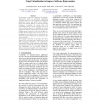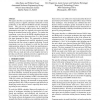267 search results - page 27 / 54 » The Linux kernel as a case study in software evolution |
ACSAC
2006
IEEE
15 years 5 months ago
2006
IEEE
Address space randomization is an emerging and promising method for stopping a broad range of memory corruption attacks. By randomly shifting critical memory regions at process in...
101
click to vote
SIGSOFT
2010
ACM
14 years 9 months ago
2010
ACM
The presence of a functionally correct golden implementation has a significant advantage in the software development life cycle. Such a golden implementation is exploited for soft...
NCA
2007
IEEE
15 years 6 months ago
2007
IEEE
In this paper, we present an approach for software rejuvenation based on automated self-healing techniques that can be easily applied to off-the-shelf Application Servers and Inte...
ICSE
2008
IEEE-ACM
16 years 19 days ago
2008
IEEE-ACM
Test-driven software development tackles the problem of operationally defining the features to be implemented by means of test cases. This approach was recently ported to the earl...
ICSE
2000
IEEE-ACM
15 years 3 months ago
2000
IEEE-ACM
This paper describes an experiment to use the Spin model checking system to support automated verification of time partitioning in the Honeywell DEOS real-time scheduling kernel. ...


